- Home
- James Phelan
Quarantine Page 13
Quarantine Read online
Page 13
“Call it scores are level,” I say. “To find a winner we take turns to shoot until we miss, twice. In a row or not, you miss two shots, you lose. Losers, their whole crews, never come back. Never.”
“Okay then Jesse, for the year,” he says. “We win, you grab your goons here and find a different place to run.
Not just for this summer . . . forever. You win, and we don’t come back. No hitching, no fighting, here in front of everyone.”
Cap steps forward.
“Nah, not you,” BB says. “Him.”
Of course, he points at me. My head spins and I swallow some blood. One of BB’s other guys is rubbing his elbow and points it at me, looking down his forearm like a sight, as if to say he’d purposefully lined me up.
“Okay,” I say. “Let’s do this.”
BB pulls off his T-shirt—he’s huge and ripped.
“Piece of cake,” I lisp, blood dribbling to the ground.
I go first. Easy shot, nothin’ but net.
BB scores easy. Like this for a bit.
“Yeah jeah!” Cap calls. “Nice shot!”
I step up for the fifth shot. My side watches intently. No pressure. I’ll be outta here in a few days anyway.
I miss.
Their team exalts, their crowd cheers. I suck it up. We make our own mistakes. Own it. Don’t miss again.
BB steps up and sinks another. Too easy—he’s a full head taller than me and built of solid confidence.
I take a breath. I can feel my heart racing. I settle it, take a moment, a third and forth bounce. An easy hoop ahead. Like the world after a storm, I am cleansed, feeling anew. I release.
Score.
BB steps up, one bounce—misses.
My boys hoot. Our injured bench give the thumbs-up.
BB pops the ball into my chest, nearly blows me off my feet.
“Don’t miss.”
I don’t.
His ball. I bounce it into him. Smile. He bounces three times. Watching the hoop. He bounces again, another three times. Shoots.
Scores.
My eye is swollen, my lip cut.
Sweaty as hell. BB calls his little brother over. He stands under the hoop, putting me off. I take a drink of water, spit out more blood, look at my bitter opponent, and say nothing.
Look at his face, his shit-eating grin. He starts to say something—
I turn and walk away.
He yells at my back: “Yeah? That it?”
I turn back. Take the shot. Off the backboard, around the rim, and through. Score.
There’s not a sound.
I say, “Get ready to get off our court.”
BB quickly pivots past me, dunks it, and yells as he hangs on the rim. The crowd cheers. Mucking around. He knows he has to line up from the foul line.
He stands there and bounces.
He and I lock eyes, a look exceeding competitive boundary. A look filled with rage. One down each. Could be his last shot, he could make it and then it could be mine. Make no mistake. I feel sick. My final bellyache.
He bounces twice. Jumps for the shot.
In.
Me.
When you’re afraid to miss you miss because you’re afraid.
I go for the shot—but I’m blocked out of it.
Caleb is there: he intercepts and is now bouncing the ball.
“What,” he says, “think you can just leave me behind?”
26
When I came to, I was on a stretcher, in a medical tent set up in a rapidly expanding tent city, ringed by aircraft coming and going. I saw plenty of commotion through the clear plastic sides. Hundreds of people dressed in uniforms ran around with weapons and equipment.
Medical staff rushed about just as urgently. The doctors and medical staff who attended me were gentle. They took some blood samples, then cut off my clothes and wrapped me in a silver foil wrap and a blanket. My bandages were changed and an IV inserted in my arm. I wanted to protest, say how Paige had chosen those clothes for me. Ask how the others were. How Caleb was.
Soldiers rolled out wire fences along the perimeter of the rec reserve. Others were setting up machine-gun posts. They’re settling on this little piece of Manhattan, I thought; protecting it. Why? Then what would happen? Would they spread out, radiate out into the city, offering whatever help they can provide? Too little, too late . . .
My friends were there, all lined up and talking to soldiers.
A few of the soldiers had video cameras, and a couple of people who were dressed in civilian gear looked like news crews setting up. A set of TV screens was banked up on a table in the corner of the tent with a large satellite dish outside all of it, connected via thick cables to a big green generator.
First, I heard the voice of a female news reporter: “It’s been twenty-one days since the attack, and here in Manhattan we are at a quarantine zone being set up near ground zero . . .”
In a moment I saw their news feed via a screen. I stared at the passive faces talking to cameras. Logos of news agencies and networks flashed up. All making their claim as newsbreakers, as if this were just like any other disaster.
My awareness still flickered in and out—for how long exactly, I don’t know, but judging by the fading daylight it may have been a couple hours. It was easy to imagine what used to be here, around me, in this mess. What was charred and burned in this landscape. What the contents of this dust and debris and ruin used to be. Billions of cells of human beings, reduced to another form of carbon, and here we were living and breathing it.
A nurse patched up my face. She poked and prodded, fixed up the cut above my brow, which was now swollen and throbbing. She’d taken my blood earlier and handled everything with care. Every now and then I heard gunfire, the sharp crack-crack-crack of military assault rifles.
“What is this?” I asked her.
She looked down at me. The tent was vibrating as aircraft took off or landed.
“What’s what?”
“This . . .” I said, with a wave of my hand. “All this, all these aircraft and equipment—who are you?”
“We’re US military,” she said with a small smile. “We’re here to help.”
I smiled, she smiled back, but the unspoken question hung heavily between us. Where the hell had they been all this time?
“Why—what took you so long?”
“Quarantine,” she said, revealing only what she had been instructed to say. “We had to wait this long.”
She spoke as efficiently as she worked, and eased some wadding up my nostrils, holding it in place with tape.
It was the first time I’d heard the word. The way she said it, so neutrally, denied it of the significance I knew it must really have. “Quarantine?”
“Exclusion zone, containment.”
“So you’ve been out there watching what’s going on in here all this time . . .”
She didn’t reply, but it wasn’t as if I needed clarification. The explanation was obvious. It had been all around me for the whole time. All those aircraft I’d seen or heard these last three weeks, that was them, watching, waiting.
“Here, I’ll help you sit up,” she said, and helped me prop myself up against some air-inflated pillows. She put a little device in my hand, a button linked to the IV. “Press that if you feel like there’s too much pain.”
A big group of soldiers walked past the tent, moving out. There must have been at least sixty of them. A few were dressed in some kind of shiny space suits.
Then I saw a spark. A flame. What I had guessed were air tanks on the soldiers’ backs were in fact some kind of flamethrower—hot jets of fire that would squirt across streets, burning cars and bodies. A cleanup crew. They would light fires, burn wrecked cars. I had half a thought that the flames might start it all again—it might ignite some spore of the contagion, or explode some hidden missile that hadn’t yet gone off...
“No—” I shuddered.
“It’s all right,” she said, calm as ever. She tr
ied on a reassuring smile, made some notes on my chart. There seemed to be a lot for her to write. I guessed it was my story, at least her interpretation of it. From time to time she looked across briefly, inspecting the television screen. She nodded to me, as if saying I should look at it. All the answers I needed were being revealed—at least, all the answers I was going to get.
On the screen was an image of the US president standing in front of the cameras, surrounded by generals. I thought back. Wasn’t he in New York when this happened? Did that mean he got out—or was this file footage?
I tried another question. “Who was responsible for the attack? You must know that by now.”
“Depends who you believe,” she said.
I couldn’t read the news ticker from this distance but I thought it said something like, “. . . the EU, China and Russia are cooperating . . . ,” then the screen changed to footage showing a sign that read: USAMRIID Headquarters.
“Please, tell me,” I said. “Australia. It’s my home. Is it okay?”
She looked out the door as the news crew ran by, animated. The screen now showed a live feed from a helicopter flying over Manhattan. Streams of people, many thousands, streaming out of buildings and other refuge areas and heading towards Central Park. Survivors.
I imagined standing in that street, still, among this mass of survivors that I’d barely seen any hint of before, a crowd that’d be all laughs and cheers and tears as they streamed past me. Firefighters, cops, suits, kids, homeless, all walks of life beaming with hope at the arrival of help, waving up at the passing chopper. Who they became in those three weeks had been pushed back in their psyche, now they were all New Yorkers again.
“Please, my home—”
Someone was tapping on the side of the tent and I looked across and saw my friends standing there. Paige waved, Bob gave me a thumbs-up. I smiled at them, then turned back to the nurse. She was looking south to the view of the aircraft and Manhattan skyline. I could just make out the top of 30 Rock.
She turned to me and I had a million other questions to ask her, but above all I wanted to know about home. Her eyes found mine. There was a moment of sadness in them, but no answers. Maybe holding onto the truth was her way of protecting herself. Maybe she thought she was protecting me.
27
“Jesse!” Felicity rushed into the tent, Rachel not far behind her, the two of them dressed in blue jumpsuits and wearing surgical masks. “You okay?
“I think so,” I said.
Rachel gave me a hug. “We’ve just passed quarantine, been scrubbed to within an inch of our lives,” she said. “They’re making sure we’re all okay before moving us out of the city.”
“Where?”
“Haven’t said, somewhere upstate.”
“They’ve set up a perimeter around Central Park,” Felicity added. “They’re just using this place as a base to venture out into the city from, until they treat all the survivors that they can, and then they’ll deal with the infected.”
“What about the group from Chelsea Piers?”
“They’re all in one of the camps here,” Felicity said. “They’re going to be airlifted out to an off-site quarantine base upstate.”
“How are they reacting?”
“They’re all fine,” Felicity said, then with a smile: “A cute little Valley Girl named Paige said, like, to say hello, and tell you they’re all, like, okay . . .”
I laughed at her mimicry of Valley-speak. “What about you guys?”
“They said I could go back to the zoo,” Rachel said.
“It didn’t burn to the ground?” I said, surprised and delighted.
“No, you’re a crappy arsonist, Jesse,” Rachel said, and smiled. “But it did the trick. It got us away from the Chasers.”
“But what use is it?” Felicity asked. “Now that the animals are gone.”
Rachel shrugged. “That’s what I told them, but they’ve already set up security there. It’s as safe a place as any.”
“Will you go back?” I asked.
Rachel shook her head. “An emergency team of relief workers from the Fish and Wildlife Service will arrive tomorrow to take over, care for whatever animals are left. Then I’ll head west.”
“Your family?”
She nodded. “I just spoke to my mom on the phone. The west coast is fine.”
A doctor in military fatigues entered. He was young, and had a friendly face that looked somehow familiar.
“Jesse,” Felicity said. “This is my brother, Paul.”
“Heard a lot about you,” Paul said, shaking my hand. He inspected my medical chart. “All looks good. You’ll be able to check out of this bunk in the morning.”
“Good,” I replied. “Can’t wait to get out of here. I’m so glad we’re all okay. It’s amazing, really. There’s just . . . one thing—”
“Caleb?” Felicity said, but she shook her head, and turned to Rachel.
“He ran off,” Rachel said. “I saw him make the tree line to the east before the aircraft touched down.”
“How did he look?” Should I tell Felicity’s brother how I’d seen Caleb become infected?
“It was hard to tell,” Rachel replied.
“He’ll be fine, for now,” Paul replied. “But he won’t have long out there in the city.”
I looked at him, trying to figure out what he’d said—was he saying that as a medic, or did he know more about what was going on here?
“What—what is it?” I asked, thinking maybe I’d missed some pertinent point. I pushed the morphine button.
“They’ve got cleanup squads gearing up to go out tonight,” Paul said.
“Cleanup—for what?”
“Probably be out there doing it each night for a while,” he said. “At least until this quarantine zone is closed and the curfew in the city’s lifted.”
“What’s that?” I asked, sitting up further. “I—I don’t get it, like cleaning up the mess so they can drive down the streets?”
Paul shook his head. “They’re going out to ‘clean up the streets’—that’s their term, not mine. It means they’ll kill all the aggressive infected—”
“They can’t do that!”
“I don’t like it any more than you,” he said.
“Can’t—can’t they do it some other way?”
He didn’t answer, but Rachel asked: “How many do they figure are infected like that?”
“They’ve put the number at one or two percent.”
“Of the infected population?”
“Yep.”
“And they’ll just kill them?” I felt like I was going to explode, a hot rush of frustration flaring up my neck. “They can’t stun them or catch them?”
“It’s how they’re doing it,” Paul said, checking around as if wary about being overheard. “Damn criminal if you ask me.”
“Criminal?” I said. “It’s insane! I mean, they’re fellow people, Americans, tourists . . .”
It was clear Paul and the others felt exactly the same; I could not take my anger out on them.
“Why are they doing this by night?” Rachel asked, her voice quiet and matter-of-fact.
Paul motioned at the news crews over his shoulder, still broadcasting outside and interviewing some of the survivors. Tom and Paige were talking to them, Audrey was nodding silently, all of them dressed the same as my friends here, in the quarantine garb.
“So that they and their choppers don’t get footage of it. The city’s a no-fly zone by night.”
“So, it’s just so that they can do their dirty business in secret?”
Paul nodded.
“And what will they do with the other infected?” Rachel asked. “All the thousands out there now, being corralled—”
“They’ll be fine.”
“How do you know that?” I asked him.
“Because this virus wears off.”
What did he just say? But there was no mistake. “Wears off?!”
“The w
orst of it has subsided,” Paul said, looking around the tent. “Slowly, the infected’s faculties return and, as they do, we can treat the docile ones. Frostbite, exposure, malnutrition, physical injuries—the list goes on. It’s going to be an epic task.”
“And—what?” I said. “The others are seen as too hard to treat?”
“They’re too hard to handle and since there’s no cure—”
“So just kill them?”
“There’s no improvement in them,” Paul said. “It doesn’t wear itself off like with the others, there’s really little we could do, even if we rounded them up someplace.”
“So they’re doomed to die or be killed?” Felicity asked.
“Looks that way.”
“So, these teams . . .” I paused, thinking it through, “they’re going out when it’s dark, when the media helicopters are not there, to kill the worst of them, and there’s nothing we can do to stop them?”
Paul said, “Right now there’s no choice—”
“There’s always choice.”
“Jesse, I know what you’re saying, but in this case—”
“There has to be a way.”
“They have to do it this way to move fast, so that they can process more survivors and more of the other infected, like you guys and like all those thousands gathered around here.”
“You can’t save them all, so why bother even trying?”
“We have to triage this,” Paul said. “This—they’ve got contingencies for situations like this, protocols that they follow. It sucks, and I’m sorry about your friend. God knows, we’ve all got friends out there.”
We were all silent for a bit. Around us, the noise seemed to grow louder: the hum of the generators powering the medical and heating and lighting equipment, the constant comings and goings of the aircraft, the babble of hundreds of people as they passed.
“How many are there like us?” Felicity asked. “Out there in the city?”
“Estimates are around half a million.”
“Half a million?” It was much more than I would have guessed, but then New York was a giant city. I’d barely got to scrape the surface of it before the attack happened. Maybe it was a good thing I didn’t have a proper sense of scale, otherwise I might have decided escape was just too big a challenge. I took in the statistic once again, tallied it with my own experience. It still didn’t seem real. “I’ve been here alone—I’ve seen hardly any evidence of survivors, let alone half a million.”

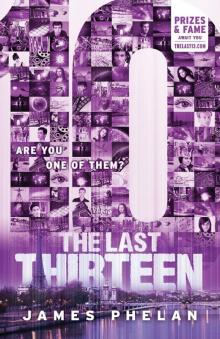 10
10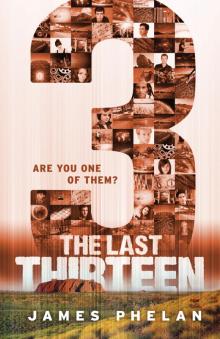 3
3 Survivor
Survivor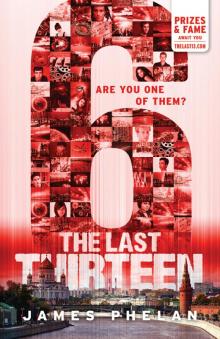 6
6 The Hunted
The Hunted Quarantine
Quarantine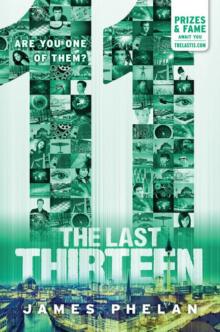 11
11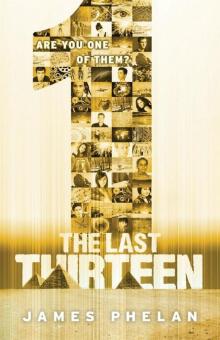 The Last Thirteen - 1
The Last Thirteen - 1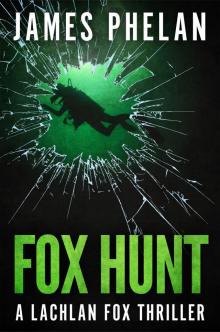 Fox Hunt
Fox Hunt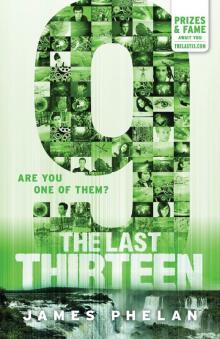 9
9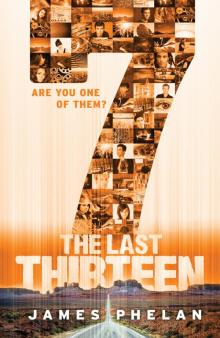 7
7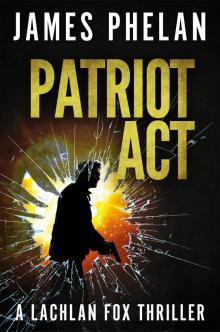 Patriot Act
Patriot Act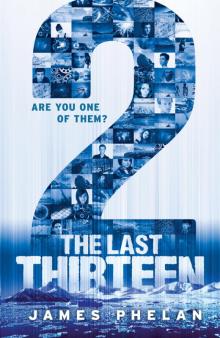 2
2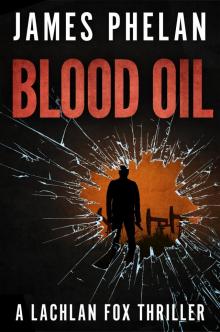 Blood Oil
Blood Oil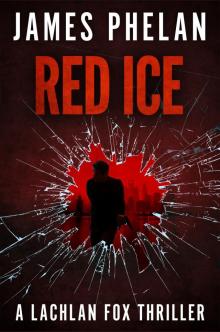 Red Ice
Red Ice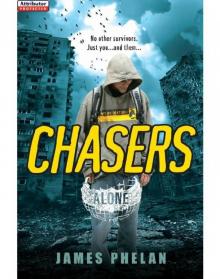 Chasers
Chasers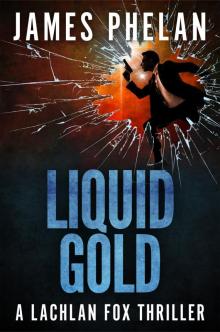 Liquid Gold
Liquid Gold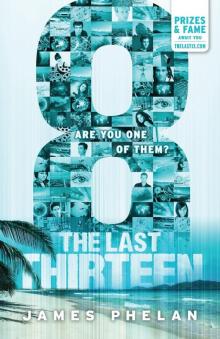 8
8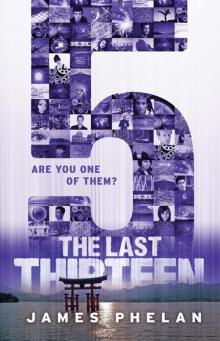 5
5 The Spy
The Spy Kill Switch
Kill Switch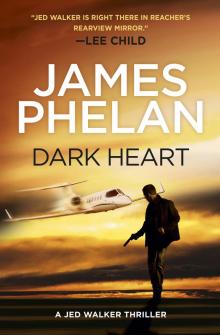 Dark Heart
Dark Heart